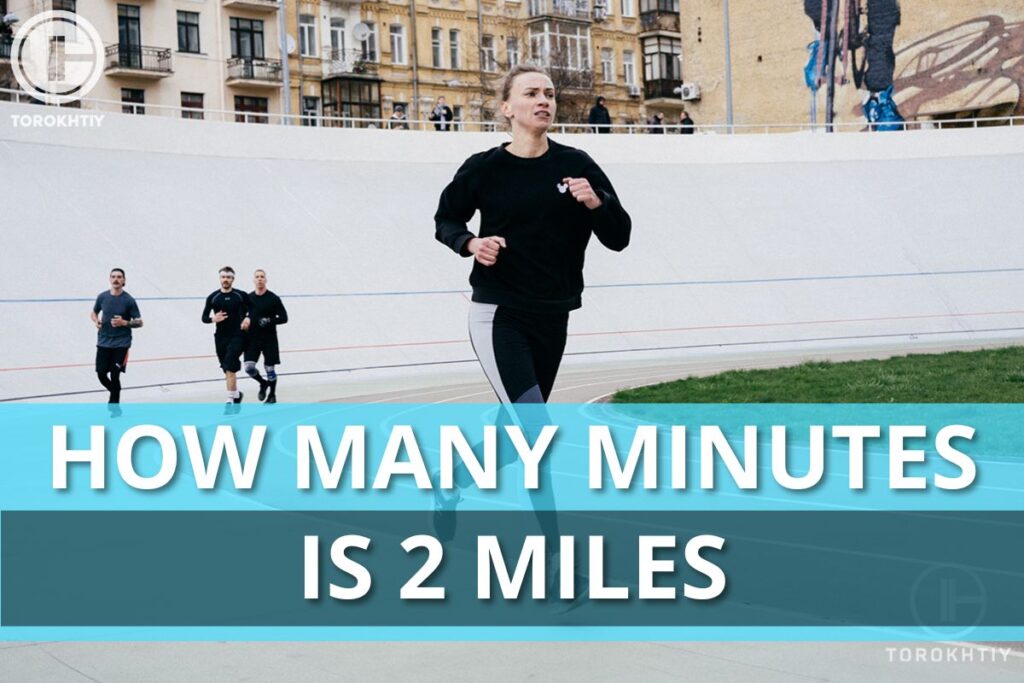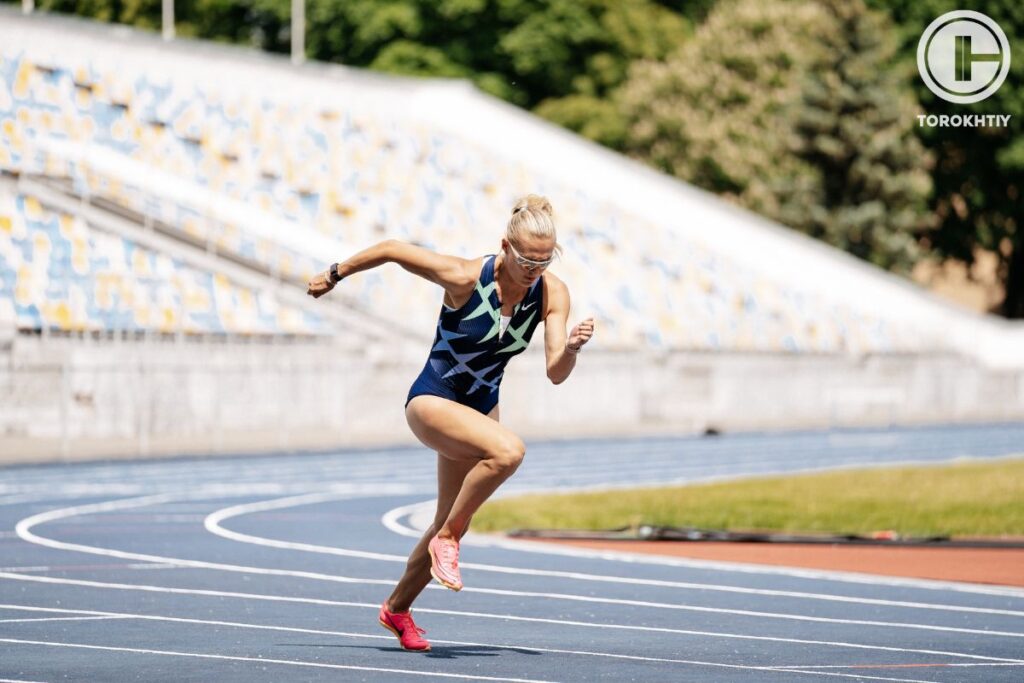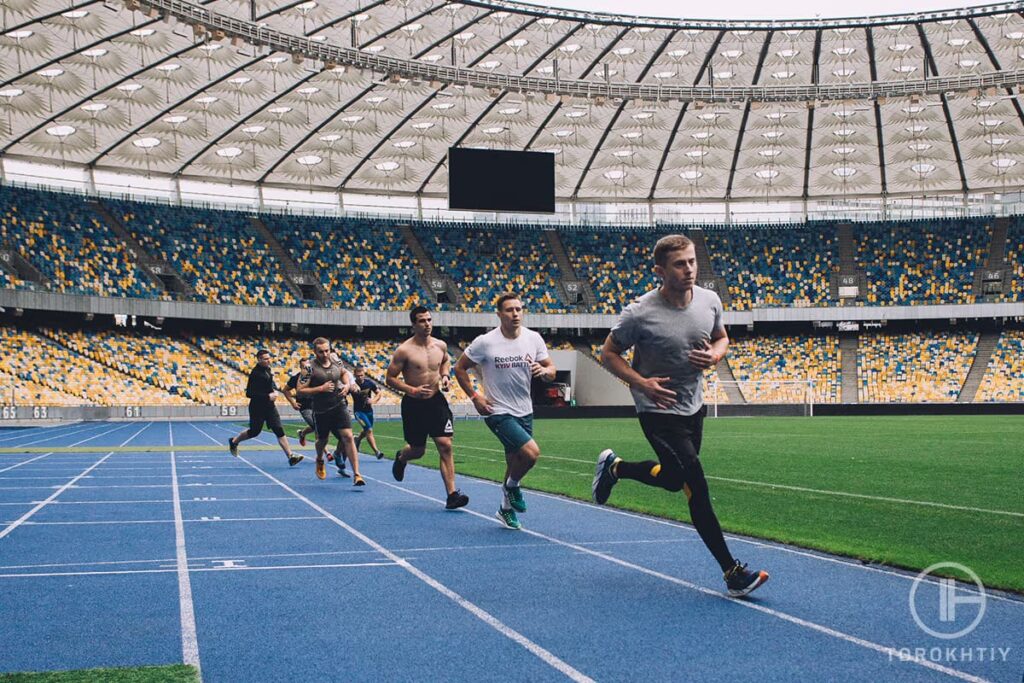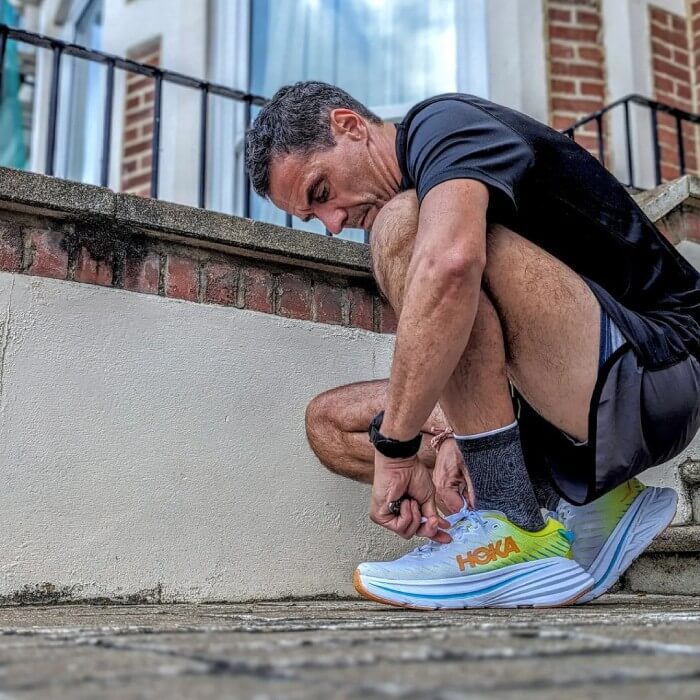How Many Minutes Is 2 Miles: 4-Week Workout To Run Non-Stop
Author:
Unlock your full potential by engaging with our experts and community! Have questions about your fitness journey or looking for expert advice on weightlifting techniques? Don’t hesitate — leave a comment below and Oleksandr Zagrebelnyi will provide a personalized answer and insights to help you reach your goals.
Torokhtiy is reader-supported. Some links are affiliate links, and we may earn a commission at no extra cost to you. See our disclosure page for details.
Are you interested in running and wondering how many minutes it takes to cover 2 miles? Want to know how many minutes is 2 miles for beginners or experienced runners? Looking for ways to improve your running time? This article provides a comprehensive guide on how far is 2 miles in minutes, the benefits of running 2 miles a day, and more.
How Much Time Does it Take to run 2 miles? – Running 2 miles takes an average of 12 to 17 minutes, although it can range from under 10 minutes (for experienced runners) to over 30 (for beginners). Benefits of running 2 miles every day include improved cardiovascular fitness, stress reduction, and weight loss (if coupled with a healthy diet).

What Is 2 Miles in Minutes?
How long is a 2-mile run? The distance of 2 miles is equivalent to 3.2 km, 3,218 meters, and 10,560 feet. Runners take approximately 1500-1800 steps per mile, so running 2 miles typically requires 3000-3600 steps in total.
A 2-mile run is considered a “middle-distance” in the world of running. As such, it allows runners to challenge both their speed and endurance. For some beginner runners, a 2-mile run can seem daunting, but with proper training and pacing techniques, it is achievable without taking up too much time from your daily routine.
Running 2 miles is less strenuous than other running events, like 5k or 10k runs, which are longer distances requiring greater exertion and increased risk for injury due to fatigue. As such, 2-mile races provide an ideal opportunity for those wanting to work on their leg speed and agility while not placing undue strain on joints and muscles.

What Is a Good 2-Mile Time?
How long does it take to run 2 miles? A 2-mile run can be completed in 15-20 minutes by novice runners with some practice. For more experienced athletes, an average 2-mile run time might range from 10 to 12 minutes, depending on factors like their fitness level and age.
Elite athletes are capable of completing a 2-mile run in approximately 9 minutes. The current fastest recorded men’s time stands at 07:54, while the women’s record is 8:58.
Average time to run 2 miles for different fitness levels
| Level | Men | Women |
|---|---|---|
| Beginner | 20:00 | 24:00 |
| Experienced | 12:00 | 14:00 |
| Elite | 9:00 | 11:00 |
If your goal is to complete a 2-mile run in under 15 minutes, it will require dedication and consistent training.
Is It Useful to Run 2 Miles Every Day?
Running 2 miles a day can give you several benefits. But first, let’s discuss whether it is enough for everyday running.
Is It Enough to Run 2 Miles Every Day?
Running 2 miles a day can be an excellent way to get in shape and increase overall health. Running for just 30 minutes at a moderate pace can provide many benefits, such as reducing the risk of stroke and heart attack, improving cardiovascular fitness, weight management, and increased metabolic rate.
That being said, it’s not recommended to run every day. Incorporating strength training into your routine a couple of times per week and taking breaks after hard runs are key to preventing injury and allowing muscles to rest.

4 Benefits of Running 2 Miles Regularly
✅ Improved Running Fitness
Running 2 miles a day can contribute significantly to overall fitness and improved running performance. It targets heart health, lung capacity, muscular endurance, joint mobility, fat burning, and more.
✅ Weight Loss and Management
Running 2 miles regularly can be an effective tool to help with weight loss. When combined with a healthy diet and other lifestyle changes, it can lead to a significant reduction of excess body fat.
Incorporating running into your regular lifestyle can help you manage body composition better and ensure sufficient energy expenditure for optimal health.
✅ Reduced Stress and Anxiety
Running can be an effective way to manage stress and anxiety. Physical activity has been scientifically proven to have a positive impact on mental health, self-confidence, and well-being.
During running, the body releases endorphins, which give you a feeling of wellness, reduce levels of stress hormones (such as cortisol and adrenaline), and increase serotonin, which provides relief from tension and depression.
✅ Improved Sleep
Research suggests that engaging in regular aerobic exercise such as running can potentially have beneficial impacts on sleep patterns. It helps reduce stress levels, promoting relaxation and providing an increased sense of control over physical health. It also has the benefit of additional energy expenditure, which causes you to feel tired when bedtime comes around.
How to Run 2 Miles Without Stopping?
Keep reading to find the best tips to improve your 2-mile running time.
1. Get the Proper Gear
The most important piece of equipment is supportive running shoes that fit comfortably. Additionally, choosing clothing that is lightweight and made with sweat-wicking fabric can help keep runners cool during their runs and minimize chafing and discomfort.
Here are some other items to help you make your run more comfortable:
- A water bottle to stay hydrated
- A headband or hat to absorb sweat and protect you from the sun’s rays
- Reflective gear for safety in low-light conditions
- Compression sleeves for extra support in the lower leg muscles
- Armbands for convenient storage when you need your hands free during a workout
Hoka Bondi 8
- Material: Breathable and supportive mesh upper
- Sole Material: Full-length EVA midsole for maximum cushioning
- Outsole (tread feature): Durable rubber outsole with a unique lug pattern
- Drop: 4mm
- Season: Suitable for all seasons
- Special Features: Exceptional cushioning and comfort
- Size: Available in various sizes
- Type: Maximum cushioning running shoe
If you want excellent running or walking shoes or just footwear you’ll be comfortable in, you can’t go wrong with the Hoka Bondi 8.
It’s been upgraded and now they have lighter, softer materials and a new extended heel design. The heel design gives a super soft, balanced feeling from th emoment your heel hits the ground to when you push off with your toes.
As far as the weight goes, it’s around 10.80 ounces, and the heel drop is 4 mm. They’re not too heavy and the lower drop is a good balance between cushioning and feeling connected to the ground.
The Bondi 8 is focused on cushioning and keeps things simple. There’s a good amount of support without any extra stuff that you don’t really need and that would only jack up the price. Take the rear crash pad, for example – it makes for a soft, smooth ride, which is perfect if you like to run outdoors.

The upper part is made of engineered mesh, which is breathable and keeps your feet cool and dry. The tongue and collar have memory foam and mold to your foot shape. All of these features make the fit snug but flexible, which is exactly what you would want.
The Bondi 8 is eco-friendly because it uses recyclable materials in parts like the mesh and the sockliner. Plus, the shoes are completely vegan, which (if that’s important to you) is nice!
2. Start With a Slow Pace
When starting out running 2 miles, it is important, to begin with a slow pace that gradually increases over time. This not only prevents injury, but also helps build endurance and establish a sustainable routine.
Starting off slowly allows the body to adapt and adjust better to the demands of running at higher speeds, which would otherwise be too strenuous for beginners. Running at an appropriate speed can help improve overall cardiovascular fitness and stamina in order to increase distance and duration during runs without strain or exhaustion.
3. Incorporate Strength Training
Strength training works specifically on muscular strength and stamina, allowing for faster running times over long distances, as well as improved stability during runs.
Tips From the Champ
Strength training exercises like deadlifts, squats, biceps curls, and push-ups should be incorporated 1-2 days a week to build muscle. For more impactful and intense workouts that target almost all major muscle groups in one go, plyometric exercises (jump squats), resistance training (elastic bands), and high-intensity interval training (HIIT) are excellent options.
Running Coach Nike Run Club Kyiv
Is It Possible to Run 2 Miles Without Training?
It is possible to run 2 miles without any prior training, it is best to prepare yourself physically before attempting the distance.
Tips From the Champ
The importance of gradually increasing your pace cannot be overstated when it comes to running longer distances. Beginners should start by adding shorter sprints into their routine, then transition to jogging at a comfortable speed that they can maintain and build upon week after week.
Running Coach Nike Run Club Kyiv
4-Week Training Plan to Run 2 Miles Non-Stop
Get ready for longer-distance runs with this 4-week intensive running plan tailored to help get you to 2 miles without stopping!
Week 1 Training Plan to Run 2 Miles Non-Stop
You should aim for 5-minute runs, followed by 1-2 minute walks, then gradually increase the duration of your runs. Make sure that you mix recovery days with strength training sessions designed specifically for runners. Focus on compound movements, like squats or lunges, combined with upper body exercises such as push-ups and rows.
| Day | Workout |
|---|---|
| Monday | Warm-up: 5-min walk, then jog for 1 min, then walk for 1.5 min. Repeat 5 times. Cool-down: 5-min walk. |
| Tuesday | Rest day. |
| Wednesday | Warm-up: 5-min walk, then jog for 1.5 min, then walk for 2 min. Repeat 4 times. Cool-down: 5-min walk. |
| Thursday | Strength training. |
| Friday | Warm-up: 5-min walk, then jog for 2 min, then walk for 2.5 min. Repeat 3 times. Cool-down: 5-min walk. |
| Saturday | Rest day. |
| Sunday | Warm-up: 5-min walk, then jog for 3 min, then walk for 3 min. Repeat 5 times. Cool-down: 5-min walk. |
Week 2 Training Plan to Run 2 Miles Non-Stop
For those looking to build endurance and progress toward running 2 miles without taking any breaks, the second week introduces more challenging components, but still allows enough recovery.
| Day | Workout |
|---|---|
| Monday | Warm-up: 5-min walk, then jog for 3 min, then walk for 1 min. Repeat 5 times. Cool-down: 5-min walk. |
| Tuesday | Rest day. |
| Wednesday | Warm-up: 5-min walk, then jog for 3.5 min, then walk for 2 min. Repeat 4 times. Cool-down: 5-min walk. |
| Thursday | Strength training. |
| Friday | Warm-up: 5-min walk, then jog for 4 min, then walk for 2 min. Repeat 3 times. Cool-down: 5-min walk. |
| Saturday | Rest day. |
| Sunday | Warm-up: 5-min walk, then jog for 5 min, then walk for 2 min. Repeat 5 times. Cool-down: 5-min walk. |
Week 3 Training Plan to Run 2 Miles Non-Stop
The recommended workout for complete beginners is initially 30 minutes of an easy mixture of running and walking, respectively (3:2). As training progresses through week 3, the timescale changes from 15-30 minutes of slow jogging to 45-60 min runs, accordingly, with a long run on Sunday.
| Day | Workout |
|---|---|
| Monday | Warm-up: 5-min walk, then jog for 6 min, then walk for 1 min. Repeat 6 times. Cool-down: 5-min walk. |
| Tuesday | Rest day. |
| Wednesday | Warm-up: 5-min walk, then jog for 6 min, then walk for 1 min. Repeat 7 times. Cool-down: 5-min walk. |
| Thursday | Strength training. |
| Friday | Warm-up: 5-min walk, then jog for 7 min, then walk for 2 min. Repeat 7 times. Cool-down: 5-min walk. |
| Saturday | Rest day. |
| Sunday | Warm-up: 5-min walk, then jog for 10 min, then walk for 2 min. Repeat 5 times. Cool-down: 5-min walk. |
Week 4 Training Plan to Run 2 Miles Non-Stop
The goal should be to complete 15 minutes of continuous running without walking breaks, with full recovery afterward. For those who have reached this level of fitness, the focus now shifts towards incorporating more demanding intervals into typical workouts.
| Day | Workout |
|---|---|
| Monday | Warm-up: 5-min walk, then jog for 10 min, then walk for 2 min. Repeat 4 times. Cool-down: 5-min walk. |
| Tuesday | Rest day. |
| Wednesday | Warm-up: 5-min walk, then jog for 15 min, then walk for 2 min. Repeat 4 times. Cool-down: 5-min walk. |
| Thursday | Strength training. |
| Friday | Warm-up: 5-min walk, then jog for 20 min, then walk for 2 min. Repeat 2 times. Cool-down: 5-min walk. |
| Saturday | Rest day. |
| Sunday | Warm-up: 5-min walk, easy pace run for 30 min. Cool-down: 15-min walk. |
By gradually transitioning toward shorter rest periods without compromising form or technique, you will finally be ready for your first 2-mile run without any stops.
3 Tips to Improve Your 2-Mile Running Time
Here are some useful tips to help you improve your 2-mile time:
1. Pace Yourself and Focus on Your Effort
Starting off too fast can lead to feeling exhausted before making it halfway through the run. It’s important to maintain steady consistency with your pace, rather than trying to speed up later in the run, as that will only leave you fatigued and less likely to reach optimal performance.
Tips From the Champ
An effective strategy for tackling a 2-mile distance is dialing down the second mile compared to the first. Your aim should be keeping steady or possibly even reducing your cadence in order to maintain stamina and endurance levels.
Running Coach Nike Run Club Kyiv
2. Incorporate Additional Training
Speed workouts, endurance building, and race-specific strategies are all types of additional training that can help runners improve their 2-mile running time.
Speed workouts focus on swiftness and include sprints or track intervals of various lengths to practice running faster for shorter distances. This type of training helps prepare the body for quick bursts of speed, which will be beneficial during a 2-mile race.
3. Consistency and Discipline
With consistency, dedication, persistence, and commitment comes progress. A reliable routine helps runners reach their goals, since following a set schedule builds endurance and improves speed over time.
Doing the same exercises regularly, such as interval and aerobic workouts, helps build physical strength, which will eventually benefit a runner’s performance.
FAQ
How Many Calories Do You Burn by Running 2 Miles?
On average, a person weighing 150 pounds will burn between 202 and 289 calories, depending on their speed and fitness level. For people with more weight, the number of calories burned increases. For example, someone who weighs 220 pounds will burn approximately 230 to 360 calories while running 2 miles.
Can You Run 2 Miles In 10 Minutes?
It is not possible for most people to run 2 miles in 10 minutes. The average time it takes to run 2 miles is typically between 12 and 25 minutes. Running 2 miles in 10 minutes requires one to be an elite runner.
Conclusion
Running 2 miles is a great way to stay in shape and develop cardiovascular endurance. Depending on individual factors, such as fitness level, age, and running speed, it can take anywhere from 12 minutes to over 25 minutes to complete the distance.
Select runs that help develop your fitness and understand pacing guidelines to create a solid strategy for improving your time.
Is 2 miles in 15 minutes a good result for you? Please share your experience in the comments below.
References:
- The effects of place running exercises on the pulmonary function of normal adults // J-STAGE: https://www.jstage.jst.go.jp/article/jpts/29/9/29_jpts-2017-226/_article
- Running and jogging – health benefits // Better Health Channel: https://www.betterhealth.vic.gov.au/health/healthyliving/running-and-jogging-health-benefits
- A Study on the Effect of Jogging on Stress Reduction // International Research Publication House: https://www.ripublication.com/irph/ijert18/ijertv11n9_02.pdf
- Exercising for Better Sleep // Johns Hopkins Medicine: https://www.hopkinsmedicine.org/health/wellness-and-prevention/exercising-for-better-sleep
- Half-Marathon and Full-Marathon Runners’ Hydration Practices and Perceptions // PMC: https://www.ncbi.nlm.nih.gov/pmc/articles/PMC3418934/
- Photos by Torokhtiy Media Team.
Why Trust Us?
With over 20 years in Olympic weightlifting, strength training, nutrition coaching, and general fitness our team does its best to provide the audience with ultimate support and meet the needs and requirements of advanced athletes and professional lifters, as well as people who strive to open new opportunities and develop their physical capabilities with us.
By trusting the recommendations of our certified experts in coaching, nutrition, and sports training programming, as well as scientific consultants, and physiotherapists, we provide you with thorough, well-considered, and scientifically proven content. All the information given in the articles concerning workout programming, separate exercises, and athletic performance, in general, is based on verified data.
The product testing process is described in more detail here.
Oleksandr is a running coach and member of the Nike Run Club coaching team for 8 years. A participant in national and international competitions at distances from one kilometer to the ultra trail. Owner of mountain trail running camps. Nowadays Oleksandr is responsible for creating running training programs for athletes of various levels, coaching personally offline and online, conducts trail running camps in the mountains, participates in competitions.




Still have questions after reading our article? Unlock your full potential by engaging with our experts and community! Don’t hesitate — leave a comment below and Oleksandr Zagrebelnyi will provide a personalized answer and insights to help you reach your goals.